In much of rural America, the town dump remains the great equalizer. Sometimes known as the more sanitary sounding “transfer station,” it’s the place that virtually everyone has to visit, whether poor, well-off, or otherwise. It’s where the lawyer, plumber, and grandmother co-mingle like aluminum, glass, and plastic. They stand side by side and heave bags of trash while catching up on high school sports, the weather, or maybe some local gossip.
For years, my own visits to the local transfer station have been brief and largely silent. Even though I have owned a second home in this Upper Delaware River community for more than two decades, I still feel like an outsider whenever I drive up. Maybe it’s my out-of-state plates. So, while some visitors to the dump might linger and socialize, my routine is to toss my garbage in the hydraulic compactor as fast as I can, drop my mixed recyclables down a little chute that empties into a dumpster, and head out. It usually takes me a minute, maybe two. The only exception happened a few years ago, when I showed up with my old 19-foot fiberglass canoe lashed to the roof of my car. An enormous dead ash fell on it during the off season when it was stored in my backyard, crushing the hull. Disposal involved a quick conversation with the station manager who, with a nod of his chin, directed me to the container reserved for household appliances. My dead boat found its final resting place among old washing machines and refrigerators.
So, I was surprised last Saturday when in the middle of chucking a few garbage bags into the hydraulic compactor, I heard someone call over to me: “Nice car!” I looked over and saw a guy around my age standing next to an identical late model Subaru. It wasn’t like we were both driving matching DeLoreans, so I just waved. But then I saw the same National Park Service fishing permit I had on my bumper and realized I had stumbled into a fellow angler. So, we stood there among bulk containers and dumpsters and began to chat.
Turns out his place is in the village; mine’s a few miles outside of town. He spends most of his time up here trout fishing. Me, too. Then he offered this: “The river is on fire right now. Isos and olives. Big fish coming up in the riffles. Starts around three o’clock. My son got a 20-inch rainbow yesterday.”
This was good dope. I hadn’t actually been up to my place in a couple of weeks and didn’t realize the action had already transitioned into an early fall pattern with bugs and trout more active in the afternoon than evening. I thanked him for the tip, and before driving off gave him the standard: “See you on the river.” Or maybe I’d see him back at the dump. Whatever the case, I briefly felt like a local.
Later, I hiked down a trail that wound through a forest of yellowing knotweed. I emerged in front of a series of runs punctuated by short rushing riffles. Beyond the river, a steep forested hillside rose up revealing some maples already haloed in gold. The first hour of casting turned out to be quiet, but by around 3:30, as promised, I began to see small olives catching in the afternoon light, along with a few lumbering Iso duns. Soon after that, heads began poking up in the flow, some throwing water or slurping audibly.
These trout were no pushovers, I quickly learned. I missed a few, including two slow-motion risers with thick backs and deep mouths that made me wince when I whiffed, but most ignored my flies altogether. Eventually I got lucky and connected with a decent rainbow that did its best imitation of a steelhead jumping all over the river. Then I bounced a good-sized brown. And to that one fish that came up steadily no more than twenty feet away taking 100 of my best pitches, I say this: good eye. By 5:30, the bugs became scarce and the rises sporadic, so I reeled up and left. Half an hour later, I sat on the porch of my cabin sipping a beer and thinking about my next to visit the transfer station, which as it turns out, is an excellent place for the juiciest kind of gossip.





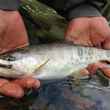


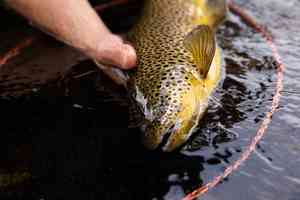


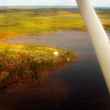

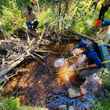
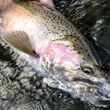
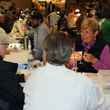




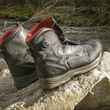



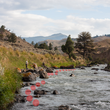






Comments